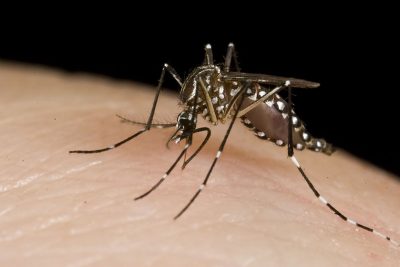
Incoming cold weather will significantly lower the risk of contracting the mosquito-borne Eastern equine encephalitis virus in Massachusetts, state officials and public health experts said.
State epidemiologist Catherine Brown, who works for the state’s Department of Public Health, wrote in an email that the disease should be out of commission for the winter because hard frosts have hit virtually all parts of the state by this point in the year, although isolated cases may still occur.
“Risk for mosquito-borne disease is virtually eliminated by the first local hard frost which kills most remaining adult mosquitoes,” Brown wrote. “A hard, or killing frost, is defined meteorologically as two consecutive hours of temperatures below 28 degrees Fahrenheit or three hours below 32 degrees.”
An outbreak of the potentially fatal EEE virus hit Massachusetts in late summer this year. The state has seen 12 cases of EEE in humans and nine in animals this year — eight horses and one goat. Of those cases, there have been four reported human deaths caused by the virus, according to a press release from the DPH.
The DPH and the Mosquito Control Districts assess EEE risk by monitoring mosquito populations and searching for traces of the virus in mosquito samples, Brown wrote. Other relevant indicators include weather patterns, the mosquito’s local habitat and time of year in relation to mosquito season, Brown wrote.
Brown said it is difficult for experts to determine changes in risk because as the cool weather approaches starting in early October, mosquitoes become less attracted to traps and thereby harder to track. However, researchers have data showing less than 5 percent of known cases occur after mid-September.
Caitlin McLaughlin, media relations specialist for the Boston Public Health Commission, said individuals can minimize chances of contraction by wearing bug repellent and appropriate clothing. However, McLaughlin said the current EEE outbreak has not spread to the City of Boston.
“At this time, no human or animal cases of EEE have been detected in Boston,” McLaughlin said. “Mosquitoes rarely test positive for EEE virus in Boston.”
Infected mosquitoes spread the EEE virus by biting unsuspecting hosts, such as horses or humans. The first symptoms of the virus are flu-like, with many patients experiencing fever, headache and fatigue within four to 10 days of being bitten.
Encephalitis, a swelling of the brain, is a complication that can also occur shortly after the initial symptoms and is a far more severe symptom of the virus, according to the DPH. Those who contract encephalitis typically experience more intense symptoms such as vomiting, loss of consciousness, disorientation and in some cases coma.
Approximately one-third of patients who contract EEE die, while many who survive are left with mild to severe neurological disorders, according to the Centers for Disease Control and Prevention.
Outbreaks of EEE occur roughly every 10 to 20 years and last between two and three years. The last outbreak in Massachusetts was between 2010 and 2012, during which there were nine confirmed cases in humans and four deaths.
“Although mosquito season is over for 2019, EEE activity usually occurs in 2-3 year cycles,” Brown wrote. “DPH, local health departments, Mosquito Control Districts, the Massachusetts Dept. of Agricultural Resources and many others are planning for next year.”
The Boston Public Health Commission partners with the Suffolk County Mosquito Control Project to trap mosquito samples weekly during the late summer and fall to test for the presence of EEE and other mosquito-borne viruses such as the West Nile virus.
While there is no vaccine or treatment for the EEE virus, there are ways to minimize the likelihood of contracting the disease.
The CDC encourages using insect repellent, wearing clothing that minimizes skin exposure and avoiding outdoor events between dusk and dawn, when mosquitoes are most active.
Tim Huang, 24, of Brookline said he is not particularly concerned about the virus as winter draws closer.
“I haven’t really seen any mosquitoes in weeks,” Huang said. “So, I’m not super worried or anything.”
Edward Rivera, 19, of the South End said that although he doesn’t like the cold, the recent weather’s effects on mosquito appearances provide a silver lining.
“That might be the only good thing about this cold weather,” Rivera said. “No mosquitoes but 30 degrees.”
Maxim Jordan, 21, of Back Bay said remaining mosquitoes might still carry EEE into urban hubs.
“I usually wear bug spray when it’s warm outside but I’m going to make sure to be more careful until it gets really cold,” Jordan said. “The last thing anyone needs right now is a mosquito death virus.”
CORRECTION: A previous version of this article incorrectly stated that BPHC spokesperson Caitlin McLaughlin said the City of Boston has “always managed to avoid the EEE risk.” The article has been updated to reflect these changes.
















































































































